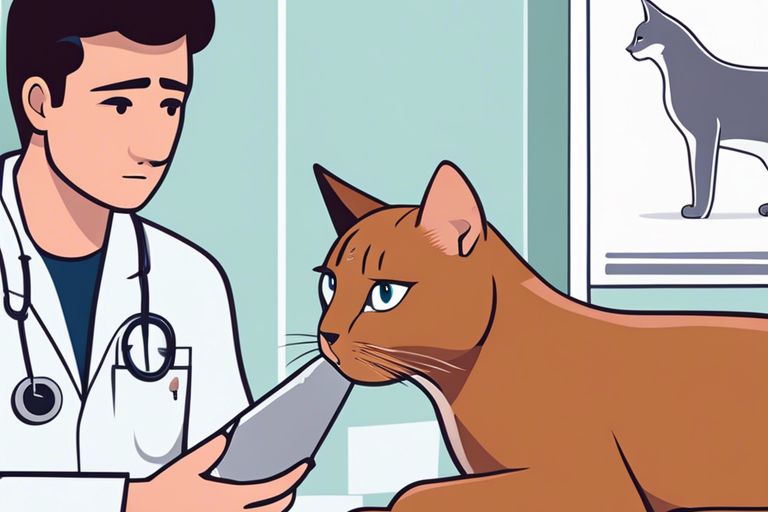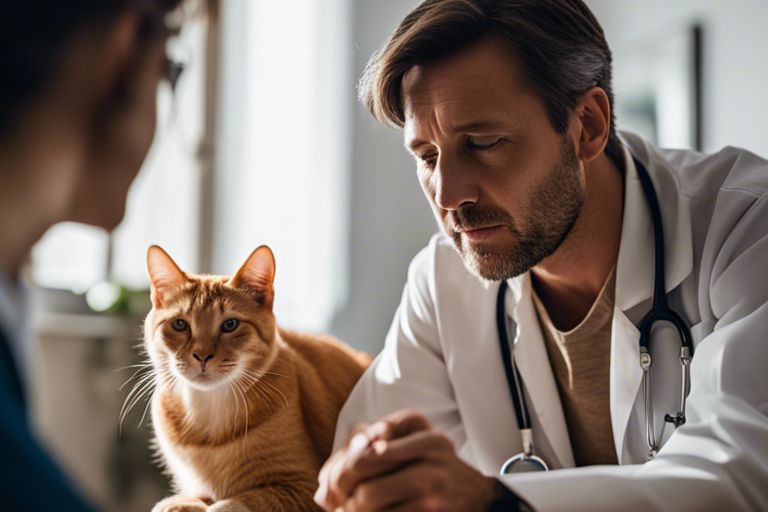Recognizing the signs of pancreatitis in your feline companion can be crucial in obtaining timely treatment and preventing further complications. Although it is a relatively rare condition in cats, pancreatitis can be serious and even life-threatening if not diagnosed and managed appropriately. Understanding the symptoms and knowing when to seek veterinary care can make all the difference in your cat’s health and well-being.
Key Takeaways:
- Abdominal pain is a common sign of pancreatitis in cats, which can manifest as hunching, reluctance to be touched, or crying out when picked up.
- Loss of appetite is another key sign of pancreatitis in cats, as they may refuse to eat or show disinterest in their food.
- Vomiting and diarrhea can also indicate pancreatitis in cats, as inflammation of the pancreas can cause gastrointestinal distress.
- Dehydration may occur in cats with pancreatitis, so it’s important to monitor their water intake and administer fluids if necessary.
- Jaundice, characterized by yellowing of the skin and eyes, can be a sign of more severe pancreatitis in cats and should be addressed by a veterinarian immediately.
Understanding Pancreatitis in Cats
Some cats may suffer from pancreatitis, a condition characterized by inflammation of the pancreas. The pancreas plays a crucial role in digestion and blood sugar regulation. When it becomes inflamed, it can lead to a range of symptoms and potential complications for your cat.
Types of Pancreatitis in Cats
There are two main types of pancreatitis in cats: acute and chronic. Acute pancreatitis comes on suddenly and can be quite severe, while chronic pancreatitis is a long-term condition that may not show obvious symptoms right away. Recognizing these differences is important for understanding and managing your cat’s condition.
| Acute Pancreatitis | Chronic Pancreatitis |
|---|---|
| Severe and sudden onset | Long-term and gradual |
| Obvious symptoms | Less obvious symptoms |
| Requires immediate medical attention | Needs long-term management |
| Higher risk of complications | May lead to permanent damage |
| Treatment may be more intensive | Requires ongoing monitoring |
Causes of Pancreatitis
The exact causes of pancreatitis in cats are not always clear, but there are several potential triggers. Dietary indiscretion, obesity, and certain medications are commonly associated with pancreatitis in cats. In some cases, underlying health conditions such as diabetes and inflammatory bowel disease may also contribute to the development of pancreatitis. Understanding the potential causes can help you take steps to minimize your cat’s risk of developing this condition.
Signs of Pancreatitis in Cats
Any cat owner should be aware of the signs of pancreatitis in their feline companion. Pancreatitis is a serious condition that can lead to severe complications if left untreated. Knowing the signs and symptoms can help you detect the condition early and seek prompt veterinary care for your cat.
Behavioral Changes
When it comes to pancreatitis in cats, behavioral changes can be an important indicator. You might notice that your cat is lethargic, less active, and has a decreased appetite. Your cat may also appear to be in pain, displaying signs of discomfort such as hunching over or guarding their abdomen. Additionally, some cats with pancreatitis may become more irritable or aggressive due to their discomfort.
Physical Symptoms
Along with behavioral changes, pancreatitis in cats can also manifest in a variety of physical symptoms. You may observe vomiting, diarrhea, and dehydration in your cat, which can indicate a serious underlying issue. Some cats with pancreatitis may also have jaundice, which causes a yellowing of the skin, eyes, and gums. Additionally, you may notice that your cat has a tender or painful abdomen when you touch it, as well as a possible fever.
Diagnosis and Treatment
To properly diagnose and treat pancreatitis in your cat, you will need to work closely with your veterinarian. The process will involve a thorough examination, as well as various tests to confirm the diagnosis and determine the best course of treatment.
Diagnosing Pancreatitis in Cats
To diagnose pancreatitis in your cat, your veterinarian will likely start by conducting a physical examination and obtaining a complete medical history. Blood tests, including a complete blood count and serum biochemistry profile, will be performed to assess your cat’s overall health and detect any signs of inflammation or organ dysfunction. Additionally, your vet may recommend abdominal imaging, such as ultrasound or radiographs, to evaluate the size and appearance of the pancreas. In some cases, a fine needle aspirate or biopsy of the pancreas may be necessary for a definitive diagnosis.
Treatment Options and Management
If your cat is diagnosed with pancreatitis, treatment will focus on managing their symptoms and addressing any complications that may arise. This may include hospitalization for supportive care, such as intravenous fluids to maintain hydration and medications to control pain and inflammation. In severe cases, your cat may require nutritional support through a feeding tube or specialized diet. Your veterinarian will also work with you to develop a long-term management plan to reduce the risk of recurrence and support your cat’s overall health.
Prevention and Care
Unlike some other health conditions, pancreatitis in cats cannot always be prevented, but there are steps you can take to minimize the risk and provide the best care for your feline friend if they are diagnosed with the condition.
Diet and Nutrition
Feeding your cat a balanced, high-quality diet is crucial for their overall health and can contribute to preventing pancreatitis. Avoid feeding your cat table scraps and foods high in fat, as these can contribute to the development of pancreatitis. Additionally, make sure your cat has access to plenty of fresh, clean water to help support their digestive system.
Regular Veterinary Check-ups
Regular veterinary check-ups are essential for catching any signs of pancreatitis early and ensuring your cat is receiving the proper care and treatment. Your veterinarian can provide guidance on your cat’s diet and help monitor their overall health to catch any potential issues before they escalate. Additionally, routine bloodwork and other diagnostic tests can help identify any underlying issues that may contribute to pancreatitis.

Conclusion
Considering all points, it is important to recognize the signs of pancreatitis in cats in order to seek prompt medical attention. If you notice any of the symptoms such as decreased appetite, vomiting, diarrhea, or abdominal pain in your cat, it is crucial to consult a veterinarian as soon as possible. Early detection and treatment can help prevent further complications and improve the prognosis for your feline companion. Monitoring your cat’s behavior and seeking veterinary care when necessary can make a difference in managing pancreatitis and ensuring your cat’s overall health and well-being. Stay vigilant and attentive to your cat’s health to ensure they receive the care they need.
FAQ
Q: What are the signs of pancreatitis in cats?
A: The signs of pancreatitis in cats can include vomiting, diarrhea, abdominal pain, loss of appetite, lethargy, and dehydration. It’s important to note that these symptoms can also indicate other health issues, so it’s crucial to seek veterinary care for an accurate diagnosis.
Q: How is pancreatitis in cats diagnosed?
A: Pancreatitis in cats is typically diagnosed through a combination of physical examination, blood and urine tests, and imaging techniques such as ultrasound or x-rays. Your veterinarian may also perform a specific blood test to measure pancreatic enzymes and determine the severity of the pancreatitis.
Q: What are the treatment options for pancreatitis in cats?
A: Treatment for pancreatitis in cats may include hospitalization for intravenous fluids, pain management, anti-nausea medication, and nutritional support. In severe cases, a feeding tube may be necessary. It’s important to follow your veterinarian’s recommendations for at-home care and dietary changes to help manage and prevent future bouts of pancreatitis.

Jayley, a devoted cat enthusiast, also writer for other cat blog as well. She aims to dedicated to providing comprehensive information, insights, and advice on everything you’d ever want to know about our whiskered companions.
